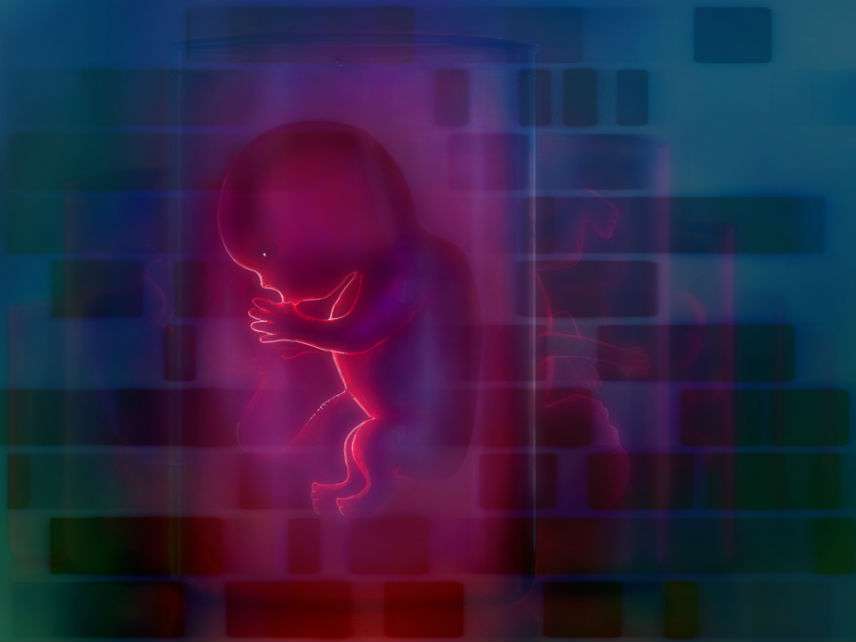Gene-Edited Kids Can Be Safely Released into the Wild Human Gene Pool
Despite bioethical handwringing, they pose no special risks to future generations

"The introduction of genetic modifications into future generations could have permanent and possibly harmful effects on the species," a group of prominent bioscience researchers write in Nature. They are calling for a global moratorium on gene-editing human embryos. "These mutations cannot be removed from the gene pool unless all carriers agree to forgo having children, or to use genetic procedures to ensure that they do not transmit the mutation to their children."
The birth last year of twin girls Lulu and Nana, whose genomes had been modified using CRISPR editing by Chinese researcher He Jiankui, is what provoked these researchers and a lot of other commentators into bioethical handwringing. Some of the angst is justified: The technique's safety is unknown and the babies' parents likely were not provided with enough information to give truly informed consent.
The Nature authors are far from alone in their worries about the potential effects of gene-editing on future generations. "DNA changes can pass to future generations, potentially with unforeseen side-effects," worried The Guardian. "Will they be allowed to have children naturally, and pass on their edited genes and whatever potential side effects might arise from their altered DNA?," asked Time. Denouncing gene-editing as "an enormous threat," Washington Post columnist Marc Thiessen warned, "In genetic engineering, scientists alter the entire genetic structure of the resulting human being—changes that are then passed on to future generations." Over at bioethics.net, Jon Holmlund asserted, "Risks to later generations, that is, to the descendants of edited people, would be incalculable, and the informed consent of those later generations would be unobtainable."
The last objection about future generations giving informed consent is just ethically nonsensical. No future generation (or individual for that matter) has ever given their consent to be born, much less to be born with the specific complement of genes they carry.
But are the risks of passing along edited genes to future generations really incalculable? No. Considering how natural genetic mutations get passed down to future generations sheds a bright light on just how big a risk to future generations the twins' edited genes are. And it turns out the reproductive risks of edited genes are essentially no different than the risks associated with naturally mutated genes.
In a 2016 Genome Biology article, three European geneticists calculated how many de novo mutations each of us carries. De novo mutations are genetic alterations that appear for the first time in an individual as a result of spontaneous mutations in an egg or sperm cell of one of our parents, or mutations that occurred in the fertilized egg itself during our early embryogenesis. The European researchers calculate that there are "44 to 82 de novo single-nucleotide mutations in the genome of the average individual, with one to two affecting the coding sequence." By pointing out that a couple of mutations affect coding sequence, the researchers mean that the alterations change the operation of specific genes. All of these natural mutations could well be passed down to future generations since they all occurred through fertilization or embryogenesis.
Are the genetic changes in the Chinese twins wrought by He Jiankui especially unusual? He modified the girls' CCR5 gene with goal of blocking HIV infections. Between 5 to 15 percent of people of European descent bear a specific mutated version the CCR5 that also hampers HIV infection. He's modification of the twins' gene is not the same as the mutation found among European carriers, but it would also likely confer resistance to HIV infection. Is He's engineered mutation somehow especially "unnatural?"
To find out, Columbia University biologist Jeremy Berg asked, "Are the mutations carried by the reported CRISPR babies, Lulu and Nana, new in the human population?" His admittedly rough calculations suggest that among the world's 7.6 billion people, "it's not too unlikely that there are individuals out there who carry copies of these mutations." Berg agrees that He's gene-editing is unethical, but concludes that "the natural/unnatural distinction that one might be tempted to make is not particular[ly] relevant." The upshot is that if this gene variant (engineered or natural) doesn't have a big effect on the reproductive success of its carriers, then it is already being passed along to future generations.
Bottom line: All you folks who are parents have already passed along novel mutations to future generations while some other mutations have sporadically occurred when your kids were zygotes. Those mutations will be passed down to their kids and your grandkids and some may turn out to be deleterious (although one hopes not). Obviously, CRISPRed embryos need to be checked before they are implanted to make sure that the desired changes have been made and that no especially harmful off-target mutations have occurred. But after that, gene-edited kids can be released into the wild human gene pool with no special worries about how they might effect future generations.

Show Comments (186)